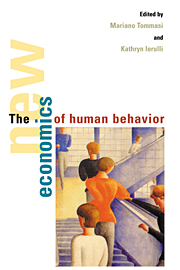Book contents
- Frontmatter
- Contents
- Contributors
- Preface
- Introduction
- PART I DISCRIMINATION AND IMMIGRATION
- 1 The economics of discrimination: a primer
- 2 The economic analysis of immigration
- PART II CRIME, PUNISHMENT, AND RIGHTS
- PART III ALL IN THE FAMILY
- PART IV GOVERNMENT AND POLITICS
- PART V HEALTH, RELIGION, AND MASS BEHAVIOR
- Index
1 - The economics of discrimination: a primer
Published online by Cambridge University Press: 03 December 2009
- Frontmatter
- Contents
- Contributors
- Preface
- Introduction
- PART I DISCRIMINATION AND IMMIGRATION
- 1 The economics of discrimination: a primer
- 2 The economic analysis of immigration
- PART II CRIME, PUNISHMENT, AND RIGHTS
- PART III ALL IN THE FAMILY
- PART IV GOVERNMENT AND POLITICS
- PART V HEALTH, RELIGION, AND MASS BEHAVIOR
- Index
Summary
Introduction
The application of the tools of economic theory to discrimination began with the publication in 1957 of the now classic study by Gary S. Becker, The Economics of Discrimination (University of Chicago Press, 1957, second edition, 1971), which was based on his doctoral dissertation.
Becker's analysis of discrimination foreshadowed his research contribution to the social sciences. The essential element in his analysis of discrimination is the role played by the individual who is maximizing his or her own well-being (utility) in a non-conventional market, given the person's resources and preferences. Individuals receive the benefits and pay the consequences of their own actions, although government policy and institutions influence the parameters within which they operate. This theme is to be found in his later research on human capital, the value of time, crime, the family, addictive behavior, etc.
Until Becker's pioneering study, discrimination in labor markets had been considered to be outside the realm of economic theory. Economics, it was said, might explain the price of butter or the rate of inflation, but could not provide insights into such “social” and “psychological” matters as labor market discrimination. Becker's study, which was quite controversial for many years after its publication, provided a very fruitful framework for looking at the consequences of discrimination in labor markets, and has directly or indirectly served as the basis of all future studies of the economic dimensions of discrimination.
- Type
- Chapter
- Information
- The New Economics of Human Behaviour , pp. 15 - 26Publisher: Cambridge University PressPrint publication year: 1995
- 2
- Cited by

